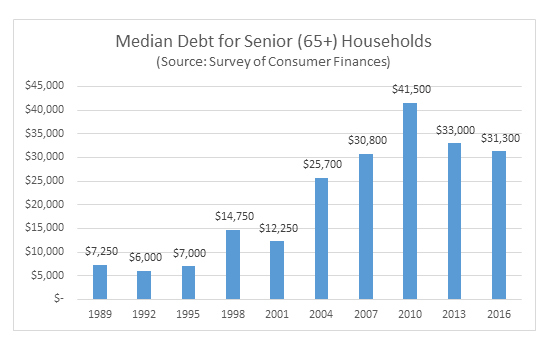The Hidden Retirement Crisis: Older Americans' Debt
Researchers are growing concerned about a certain type of borrowing
Swelling numbers of Americans these days are working in retirement, taking part-time jobs and launching businesses. And retirees are increasingly staying in their homes rather than moving to retirement communities. They’re also, however, breaking the mold in a potentially worrisome direction: embracing debt.

The median total consumer debt of households headed by someone 65 or older in 2016 ($31,300) was 2 ½ times what it was in 2001 and nearly 4 ½ times the level in 1989. Some 60% of 65+ households carried debt in 2016, up markedly from about 42% in 1992. Credit card debt and student loans have increased, too.
The rising debt levels among older Americans is not only problematic for their finances, it’s bad for their mental health.
"Starting retirement with debt could exacerbate the impact of any impending negative [financial] shocks."
“Debt-related stress is a growing concern, given the growing amount of debt held by older adults as they enter retirement,” wrote the authors of Debt Stress and Mortgage Borrowing in Older Age: Implications for Economic Security in Retirement, a paper just presented at the Retirement and Disability Research Consortium, in Washington, D.C.
The scholars behind another paper, Is Rising Household Debt Affecting Retirement Decisions?, echoed those comments. “Starting retirement with debt could exacerbate the impact of any impending negative [financial] shocks,” they noted.

Why Debt Is Rising for Retirees
What’s going on here?
The debt partly reflects confidence among near-retirees and retirees that they’ll continue earning an income during retirement, allowing them to pay the interest due. The economics behind their increased borrowing also largely mirrors the broader debt binge by consumers of all ages to pay for the rising cost of big-ticket items like cars, homes and college. (For a sad look at this trend, I encourage you to read The Wall Street Journal’s recent poignant piece, “Families Go Deep in Debt to Stay in the Middle Class.”)
Here’s what’s particularly concerning about older Americans’ debt load: Recent action in the bond markets is sending an alarm that the potent combination of trade, tariff and currency wars is slowing down the U.S. economy and possibly hurtling us toward recession.
No one, of course, knows when a recession will arrive. But one surely will sometime, as history has shown repeatedly. That’s why near-retirees and retirees would do well to shore up their finances by reducing, not increasing, debts.
The Debt That Adds Stress the Most
After wading through a stack of scholarly studies about older Americans and debt, my read is that the researchers are plenty worried.
They’ve found that owing money is pushing people in their 60s and beyond to delay retirement, postpone filing for Social Security (so their eventual benefits will be higher) and add stress to their lives.
Ohio State University’s Donald Haurin, Cäzilla Loibl and Stephanie Moulton just released an especially fascinating paper on the relationship between debt and financial stress for older Americans. In it, they described what they found to be a hierarchy of debt, stress-wise.
Credit card debt, they noted, is the most stressful type, with the strongest impact on older adults’ working longer and delaying filing for Social Security. Stress resulting from a $1 increase in credit card debt, they said, is the equivalent of stress due to a $14 to $20 increase in mortgage debt.
And second mortgages (home equity loans and lines of credit) are more stressful than first mortgages, they noted.
The researchers said that reverse mortgages — available only to people 62 and older — are less stressful than regular mortgages, dollar for dollar. But, they added, since reverse mortgage debt grows over time, stress from it may grow over time, too. By contrast, the authors noted, debt from a traditional mortgage declines over time, lowering debt stress.
Barbara Butricia of the Urban Institute and Nadia Karamcheva of the Congressional Budget Office arrived at similar results regarding credit card debt and retirement in a presentation at the Wharton School's Pension Research Council in May. They calculated that a $10,000 increase in credit card debt for someone age 55 to 70 (with the median amount of credit card debt) raises the likelihood of continuing to work by over 9 percentage points and reduces the odds of receiving Social Security benefits by about 9 percentage points.
Smart Money Advice for People 50+
These studies highlight the rising vulnerability of older adults in bad economic times.
And their findings also suggest a personal strategy to pursue: Pay off your “stressful” debts first.
In other words, if you’re in your 50s or 60s, try to direct cash flow to eliminating credit card debt and second mortgage debt. And if these debts are significant enough to affect retirement decisions, getting rid of them should make a big difference to your future economic security.
You can’t control the swings in the business cycle or the direction of the stock market. You don’t have the authority to force China and the U.S to reach a trade accord. But you can direct more income to debt reduction.
That’s a smart personal finance strategy for all seasons, especially now.


